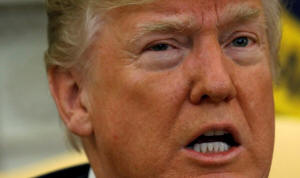|
White House says no decision on whether
to sign U.S.-Taiwan travel bill
 Send a link to a friend
Send a link to a friend
 [March 16, 2018]
WASHINGTON (Reuters) - President
Donald Trump has not decided whether he will sign legislation that would
allow U.S. officials to travel to Taiwan to meet their Taiwanese
counterparts, the White House said on Thursday, as China repeated its
opposition. [March 16, 2018]
WASHINGTON (Reuters) - President
Donald Trump has not decided whether he will sign legislation that would
allow U.S. officials to travel to Taiwan to meet their Taiwanese
counterparts, the White House said on Thursday, as China repeated its
opposition.
The legislation, approved by both chambers of the U.S. Congress, has
angered China, which regularly calls self-ruled Taiwan the most
sensitive issue in Sino-U.S. ties.
China regards the island as a wayward Chinese province with no right to
state-to-state relations.
"A final decision hasn't been made. We'll keep you guys posted," White
House spokeswoman Sarah Sanders told reporters during a briefing.
In Beijing, Chinese Foreign Ministry spokesman Lu Kang reiterated
China's anger over the legislation.

"We have said before, China is strongly dissatisfied and resolutely
opposed, and has already lodged stern representations with the U.S.
side," he told reporters.
Lu urged the United States to abide by the "one China" policy and cease
official exchanges with Taiwan.
If Trump does not veto it, the bill will become law at 12:01 a.m. EDT
(0401 GMT) on Saturday even if he does not sign it, congressional aides
said.
Douglas Paal, a White House official under Republican administrations
who served as U.S. representative to Taiwan from 2002 to 2006, said the
legislation did not change anything real as it was non-binding on the
administration.
The administration also has the discretionary authority to permit visits
by senior Taiwan officials and visits by senior U.S. officials and
military officers to Taiwan, he added.
[to top of second column]
|

President Donald Trump speaks during his meeting with Ireland's
Prime Minister, Taoiseach Leo Varadkar in the Oval Office of the
White House in Washington, U.S., March 15, 2018. REUTERS/Kevin
Lamarque

"They don't authorize these trips because the policy judgment is
that the costs in relations with China would outweigh the benefits
in relations with Taiwan," Paal said.
The United States is already bound by law to provide Taiwan with the
means to defend itself, and is the island's most important arms
supplier.
China's hostility towards Taiwan has risen since the election of
President Tsai Ing-wen, of the pro-independence Democratic
Progressive Party, in 2016.
It suspects Tsai wants to push for formal independence, which would
cross a red line for ruling Communist Party leaders in Beijing,
although Tsai has said she wants to maintain the status quo and is
committed to ensuring peace.
Defeated Nationalist forces fled to Taiwan in 1949 after losing the
Chinese civil war to the Communists.
(Reporting by James Oliphant; Additional reporting by David
Brunnstrom, and Michael Martina and Ben Blanchard in BEIJING;
Writing by Ayesha Rascoe; Editing by Jonathan Oatis and Clarence
Fernandez)
[© 2018 Thomson Reuters. All rights
reserved.]
Copyright 2018 Reuters. All rights reserved. This material may not be published,
broadcast, rewritten or redistributed.
Thompson Reuters is solely responsible for this content.
 |